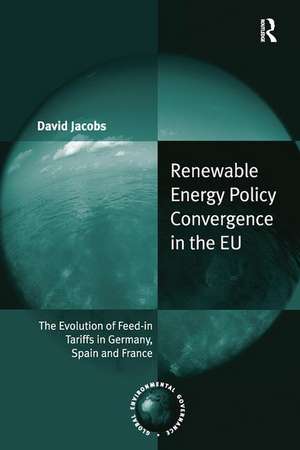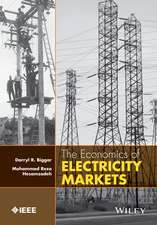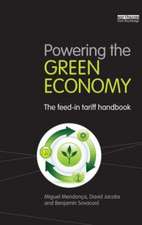Renewable Energy Policy Convergence in the EU: The Evolution of Feed-in Tariffs in Germany, Spain and France: Global Environmental Governance
Autor David Jacobsen Limba Engleză Paperback – 27 feb 2017
| Toate formatele și edițiile | Preț | Express |
|---|---|---|
| Paperback (1) | 469.34 lei 43-57 zile | |
| Taylor & Francis – 27 feb 2017 | 469.34 lei 43-57 zile | |
| Hardback (1) | 1114.88 lei 43-57 zile | |
| Taylor & Francis – 28 iun 2012 | 1114.88 lei 43-57 zile |
Din seria Global Environmental Governance
- 10%
 Preț: 313.89 lei
Preț: 313.89 lei - 12%
 Preț: 312.43 lei
Preț: 312.43 lei - 15%
 Preț: 703.08 lei
Preț: 703.08 lei -
 Preț: 468.79 lei
Preț: 468.79 lei - 30%
 Preț: 769.55 lei
Preț: 769.55 lei - 18%
 Preț: 1002.63 lei
Preț: 1002.63 lei - 5%
 Preț: 1177.16 lei
Preț: 1177.16 lei - 30%
 Preț: 774.41 lei
Preț: 774.41 lei - 25%
 Preț: 766.66 lei
Preț: 766.66 lei -
 Preț: 449.41 lei
Preț: 449.41 lei - 18%
 Preț: 1002.36 lei
Preț: 1002.36 lei -
 Preț: 469.34 lei
Preț: 469.34 lei -
 Preț: 469.34 lei
Preț: 469.34 lei - 13%
 Preț: 338.33 lei
Preț: 338.33 lei - 25%
 Preț: 769.72 lei
Preț: 769.72 lei -
 Preț: 469.34 lei
Preț: 469.34 lei -
 Preț: 469.34 lei
Preț: 469.34 lei - 30%
 Preț: 855.89 lei
Preț: 855.89 lei -
 Preț: 382.57 lei
Preț: 382.57 lei -
 Preț: 389.66 lei
Preț: 389.66 lei
Preț: 469.34 lei
Nou
Puncte Express: 704
Preț estimativ în valută:
89.81€ • 94.02$ • 74.31£
89.81€ • 94.02$ • 74.31£
Carte tipărită la comandă
Livrare economică 07-21 aprilie
Preluare comenzi: 021 569.72.76
Specificații
ISBN-13: 9781138271654
ISBN-10: 1138271659
Pagini: 312
Dimensiuni: 156 x 234 x 17 mm
Greutate: 0.45 kg
Ediția:1
Editura: Taylor & Francis
Colecția Routledge
Seria Global Environmental Governance
Locul publicării:Oxford, United Kingdom
ISBN-10: 1138271659
Pagini: 312
Dimensiuni: 156 x 234 x 17 mm
Greutate: 0.45 kg
Ediția:1
Editura: Taylor & Francis
Colecția Routledge
Seria Global Environmental Governance
Locul publicării:Oxford, United Kingdom
Notă biografică
David Jacobs is a Research Associate at the Environmental Policy Research Center (FFU), Freie Universität Berlin, Germany
Recenzii
'This is a theoretically well-grounded and empirically rich study of a highly important topic. It offers fascinating insights on the evolution of an innovative policy instrument cutting across environmental and energy policy. A recommendable book not only for those interested in these policy fields, but also for readers with a general interest in theories of policy change.' Christoph Knill, Unversität Konstanz, Germany 'The EU is actively searching for new ways to govern that do not make "Brussels" any bigger. David Jacobs' subtle empirical analysis of feed in tariff policies in three countries, ably demonstrates how it can trigger cross-national policy convergence using softer modes of governance. He manages to shed much new light on the EU's ability to govern in policy areas where its involvement is politically contested.' Andrew Jordan, University of East Anglia, UK 'Jacobs’ volume will not merely be of interest to scholars of comparative and European politics, as well as practitioners of renewable energy policy, but compulsory reading. ... this is a well-crafted analysis that covers its themes in great detail. The excellent introductory and framework chapters feature unparalleled overviews of the current theoretical and empirical literature on the subject, and the case study chapter on solar photovoltaics is superb. The volume would also be of interest to any comparativist as its small-n analysis of convergence is expertly constructed. As Jacobs notes (p. 201), domestic factors alone cannot be expected to explain policy development in an increasingly globalised world, such that ’analysing countries as interdependent rather than independent actors will be of increasing importance for political scientists’ in future. Understanding the nature of this interaction and convergence is increasingly salient in modern international politics, and Jacobs has written what will be seen as a landmark text for many years to come.' Political Studies Review
Cuprins
1: Introduction; 2: The Theoretical Framework; 3: The Empirical Framework; 4: The Evolution of Design Options for Basic Feed-in Tariffs; 5: The Evolution of Design Options for Tariff Differentiation and Adjustment; 6: The Evolution of Design Options for System and Market Integration; 7: The Evolution of Tariff Levels; 8: Powering Cross-National Policy Convergence; 9: Conclusion
Descriere
This book examines the coordination of renewable energy policies in the European Union using an innovative theoretical approach to explain national policy making. David Jacobs asks, why are national support instruments for electricity from renewable energy sources converging, even though the harmonisation of these frameworks at the European level has failed? Which causal mechanisms lead to cross-national policy similarities? And what are the implications for policy coordination in the EU?













